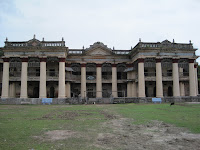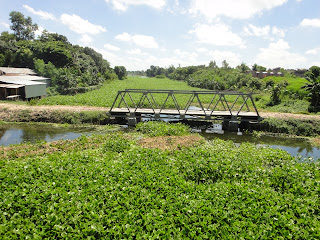I'm growing a beard while traveling in Bangladesh. Read about my growing global consciousness and facial hair.
Friday, September 3, 2010
Exploration Nation
Thursday, September 2, 2010
Beard Update: Week 6
Wednesday, September 1, 2010
Haggler’s Heaven, Non-Haggler’s Hell
Sunday, August 29, 2010
Fielding Questions
Saturday, August 28, 2010
Pyongyang (or I heart Dear Leader)
General Disarray
Friday, August 27, 2010
Tired of Being Tired
Where Everybody Knows Your Name
Thursday, August 26, 2010
The Axis of Evil Tigers
Wednesday, August 25, 2010
Beard Update: Week 5
Tuesday, August 24, 2010
Office Daze
Monday, August 23, 2010
Forward to the Past
Wednesday, August 18, 2010
Md. and Me
Sunday, August 15, 2010
Bitter/Sweet
Saturday, August 14, 2010
Beard Update: Week 4
Friday, August 13, 2010
Back in Dhaka City
I’m finally back in Dhaka, after a six hour train ride from Rajshahi. It was supposed to be a five hour train ride, but apparently the train made some unscheduled stops to aide in the illegal ferrying of goats (or at least that’s the word on the street). My time spent in the village was unforgettable, but I must say I’m extremely glad to be back in the city. I’ve never been so happy to see a toilet in my life; and I can’t even describe how good it feels to have air-conditioning again. Heat is the overwhelming reality of life in rural Bangladesh, and it just made everything difficult to endure. Unfortunately, the category of everything includes keeping a journal, so I now have a lot of work to do to get my experiences and ideas down on paper and get them to all of you. I was able to get words down on some days, but only take notes on others. I should have everything up by the end of the weekend, so check back a few times between now and then to read the many new posts. I’ll be pre-dating them for their respective days, so they will be listed BELOW this post for the dates of 08/04/2010 - 08/13/2010 (if you’re reading this after the 08/15/2010 all the posts are probably up already). It will certainly be hard to capture the true and full essence of my experience and learnings in a few relatively short blog posts, but I’ll do my best. Please ask as many questions as you like in the comments, and I’ll try and expand on any subject requested.
Thursday, August 12, 2010
Fast Food
It’s Not Easy Being Gr(am)een
Wednesday, August 11, 2010
Waste Not, Want Not
The Invisible Hand (That Takes)
Motivating the Center
The Zonal Manager continued to focus on the women’s roles as mothers by talking about the importance of educating their children, which, as I had witnessed in the villages, is the most powerful motivation for many of the borrowers. He quoted Napoleon and said, “Give me an educated mother, and I’ll give you an educated nation.” As the mothers of Grameen Bank, the responsibility of their children’s education, and perhaps the future of the nation, was in their hands. One mother stood up and said she was saving everything for her son’s education, and that she would not even tell her husband what was in her savings account. Everyone applauded her. The Zonal Manager then said he would approve Higher-Education Loans for any and all of their children who complete 12th grade; or if they had top marks, they could apply for the Grameen Scholarship program. And, if they wanted to start a business after graduating university, they could apply for a New-Entrepreneurship Loan. Grameen really is one of those thoroughly good organizations, sincerely working for the betterment of the Bangladeshi people. And providing these types of opportunities to borrowers’ children is a powerful, positive system of incentive that keeps women motivated to pay back their loans on time, in full.
Tuesday, August 10, 2010
Struggling Members
Big Man on Campus
Monday, August 9, 2010
The Beginning of Understanding
Sunday, August 8, 2010
A Plague Upon Both Your Houses
As there is no retreat from the heat out here, there is also no escape from the bugs. Each new attempt seems more futile than the last, and soon you begin to adjust (or give in). First there are mosquitoes – the definitive pest. In addition to being outright bothersome, they are carriers of Malaria and Japanese Encephalitis in this area. I cover up, wearing long pants and long sleeves in sweltering temperatures, covering the rest of my exposed areas with toxic levels of insect repellent, which seems to repel mosquitoes to some degree, but invoke frenzies among local horseflies, which are almost more bothersome than the mosquitoes, the flies relentlessly swarming around my head. Moreover, the bathroom is a virtual mosquito hide-out, where they lay in wait to get their revenge on your attempts to evade them - when you are most vulnerable and have no choice but to expose those few unprotected patches on your body - which they will surely bite. When you’ve gotten over those nightmares, then there are the ants - all different colors and sizes - everywhere. On the floor, on the wall, on the bench, on the table, then you even notice one crawling out of your dinner. And yes, you keep eating it. At night come the moths. Harmless, perhaps, but hapless to continually fly into your face due to the proximity of the light (flashlight/candle) to your head (the power is out). Green-lit fireflies try to find a mate in the indiglo on my wristwatch. King-sized cockroaches rule the bathroom floor. And just when I thought I had gotten all the bugs out of my bed net, a spider hops out and makes me think again. I hope it at least eats the mosquitoes that are in here with me, too.
The Act of Observing
This morning we went to a Center Meeting in a nearby village. The objective of this visit was to observe, so we tried our best to be unobtrusive, and let the meeting proceed as normal, but our presence was hard to ignore. After the meeting we went to interview a few borrowers, but their answers to our questions were particularly modest and reserved. When asking one woman how her life had changed after joining Grameen, we received the answer, “It got better.” When further probing did not arouse more detail, a neighbor of hers shouted, “Your home was destroyed by a flood, you had nothing when you came here, now you have land, a business and a new house!”Stories like this are common, and it’s a shame it’s sometimes so difficult to get the women to tell them. We are intimidating, I suppose.


After visiting a borrower’s betel-leaf business, we walked to the nearby village marketplace where we found a few borrowers’ husbands to speak with. As we were now in public view, a large crowd gathered around us – 20-30 men – just to watch, and state. I still don’t understand the entertainment value of staring at someone for ten minutes, but I guess there is not a lot else going on out here.

Saturday, August 7, 2010
The Temples of Doom
Lonely Planet states, “If Indian Jones were a real man, than he’d be living in Rajshahi Division. For tucked away in this unknown corner of the country are a plethora of ruins and reminders. In fact there’s so much history stashed away up here that you sometimes feel that you can’t move without tripping over some other forgotten temple or decaying palace.” Well, we all wanted to let out our inner Indy, so we made time for a little sightseeing.
Left: The adventurers gathered, waiting for our transport (Matin, Michael, Sam, Mofise the Dog). Right: A rare sighting of underground pig farmers (it's a Muslim country).




Left/Center/Right: Siva Temple













Friday, August 6, 2010
Continuing to Adjust
I’m continuing to adjust. I feel a bit better after getting some sleep last night – the first night I barely slept, if at all. I just lay in a puddle of my own sweat, constantly swatting at real and imagined bugs. We do have mosquito nettings, but a few always seem to get trapped in there with you.

And that is not to say people are unfriendly. Once we talk with people, or come into their homes, we are treated as honored guests - especially among the poor women borrowers of Grameen. Our visit is a big deal for them, and it is an honor for them to receive us. Hospitality is very important in Bangladesh.
Thursday, August 5, 2010
The (Hot)House that Grameen Built
The heat here is overwhelming. And it’s not that it’s much hotter here than it is in Dhaka (or even New York for that matter) it’s just that there is no escape from it. You just say hot and sweaty 24 hours a day. There is no A/C, no refrigeration, and even though there is no hot water, the cold water is room temperature after sitting in a black, plastic water tank up on the roof all day. Can’t catch a break….



Michael, Matin and I share one bedroom, Sam has another, and the Branch Manger a third. The beds are basically wood slabs with about 1 inch of padding (I actually got a bruise on my hip from sleeping on my side). They have one sheet - to cover the mattress pad - as it is too hot to actually require any kind of covering for your body.
Wednesday, August 4, 2010
Day One in Durgapur
I want to write you something great about how beautiful, yet dirty, and how inspiring, yet sad the villages in Bangladesh are… but I’m so damn hot. I’m sweating buckets. I’m paranoid about my growing collection of mosquito bites. And I’m sitting here, writing this in the dark, because the power is out – as is the case more often than not out here. But that stuff aside, I am so damn glad to be here.
The Road to Rajshahi


http://www.thedailystar.net/newDesign/news-details.php?nid=150560

















